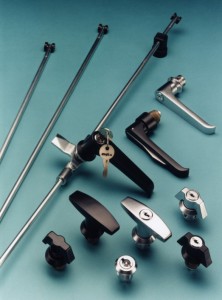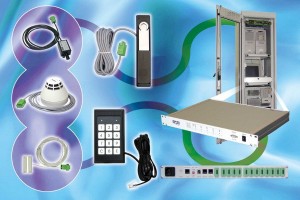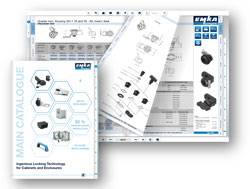By Andy Billingham, Managing Director – EMKA (UK) Ltd
One company – EMKA – has consistently developed and innovated over the past 20 years to bring forward the specialist cabinet building industry in the UK and be recognised as a true market leader. Paradoxically this has come about from listening to customers, since many new products were developed for health and safety reasons and others because engineers/designers are simply looking for a better solution – or for something different. This is a process that continues today and includes prime customer development links with major industry players that have over the years initiated developments ahead of general market need. These links enable EMKA to keep up with future technological developments as they emerge.

One of the first recognisable examples of this process was a single range of Swinghandles – a response to vandalism on electrical control cabinets and to transit damage caused by the old style L & T handles which often pushed through packaging to scrape paint on adjacent equipment, with resulting problems of on site repair or factory return. Likewise the padlockable wing handle was developed in response to a UK water board requirement for a small padlockable handle to replace the large handles then available, which were often vandalised. Other general problems for specialist enclosure manufacturers included the tricky one of how best to mount hinges – the traditional continuous “piano” hinge was not a good solution in a production environment because it is difficult to fit accurately and quickly – so the EMKA lift-off butt hinge not only reduced installation costs but also proved a stronger solution when engineered into the cabinet design.
More generally the industry has always been concerned with health and safety issues, but in recent years there has been much more focus on this area, driven in many respects by the effects of the London Underground Kings Cross fire. Following this disaster EMKA developed Low Smoke and Fume gasket to meet the elevated safety regs. and the whole industry started actively to investigate ways of eliminating potential health and safety concerns. EMKA already ahead in this with their use of insulating moulded materials extended it more widely to other products. This same H&S based thinking showed that an alternative to traditional external hinges was required in some applications and led to the many internal hinges types, which cannot be removed externally, while offering simple bolt or weld fixing with removable door facility using internal pins.
Traditionally furniture hardware ( locks and handles) has focussed on metal components – EMKA early on saw the advantages of high specification polyamide because it gives the ability to produce high accuracy detail components with multi-functionality, which enable more complex and better fitting assemblies to be fabricated. In addition it offers electrical insulation, lightness, ease of working, and the option of many different colours in contrast to the then prevalent “enclosure grey”. In particular as taste in cabinet colour changed then smart contrasting black was seen to enhance equipment presentation.
From the beginning EMKA had a large local UK stock and assembly facility in Coventry, to support a rapidly growing customer demand, then 5-10 years ago manufacturing companies slashed stock and warehousing and it became imperative for them to have a one-stop supplier policy with short lead times. This was initiated by the latest of many oil crisis, raising company running costs, which together with low dollar exchange rates, drove all costs upward and forced greater reliance on supplier partnerships – EMKA who already had an in-depth stock policy were well placed to be at the forefront of this change in supply chain management.
A tabular profile of developments show since 2005 show how growth in product solutions has kept pace with customer need. Says Managing Director David Keegan “when we started we brought a new concept to the UK in the shape of modular components specifically designed for the metal cabinet industry, rather than products simply carried over from wood furniture practice. We had seven small product groups including ¼ turn handles and only one Swinghandle. Now in 2005 we have at least 20 greatly expanded product groups. There are 20 Swinghandles , we have EMC gasket – networkable electronic monitoring and control systems are an exciting new development, and in the area of custom products we have a focused development team based at the factory. After 20 years this is obviously a milestone for us, but it is also a time when we are looking forward more than ever to develop products and services based on customer need.”
| 1985 | 2005 | |
| Yes | ¼ turn locks | Yes & Plus |
| No | Rod Control | Yes |
| Yes | Locking systems – round | Yes |
| No | Locking systems – flat | Yes |
| 1 type | Swing handles | 18 types |
| Yes | Hinges | Yes & Plus |
| No | Hinges pin fit | Yes |
| Yes | Gasket | Yes & Plus |
| No | Gasket EMC | Yes |
| No | Windows | Yes |
| No | Glazed doors | Yes |
| No | Stainless Steel | Yes |
| No | Rolez toggle latches | Yes |
| Yes | Key locks – EMKA | Yes |
| No | Keys locks – fort, ¼ turn, key locks | Yes |
| No | IP66 locks | Yes |
| Yes | Accessories | Yes & Plus |
| No | Tubular handles | Yes |
| No | Electronic locking systems with monitoring and control | Yes |
| On demand | Custom products | Focused team |
The history of this industry has required expansion of the available product range to cover all types of niche requirements and to accommodate applications created from new information technology. This has been achieved by integration of development/production processes – accumulation of new technologies, acquisition of suppliers/competitors and ensuring control focussed from the central admin and production facility where plastics moulding, painting, assembly, sales and marketing are concentrated. This ensures good communication of customer needs to the development team and continues to allow EMKA to innovate over the long term.
So we can truly say that the history of EMKA is the history of an industry.



